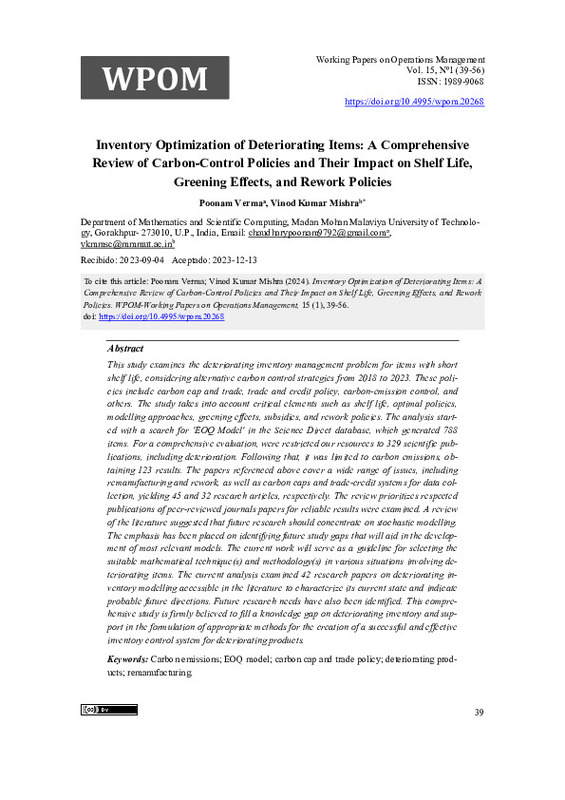JavaScript is disabled for your browser. Some features of this site may not work without it.
Buscar en RiuNet
Listar
Mi cuenta
Estadísticas
Ayuda RiuNet
Admin. UPV
Inventory Optimization of Deteriorating Items: A Comprehensive Review of Carbon-Control Policies and Their Impact on Shelf Life, Greening Effects, and Rework Policies
Mostrar el registro sencillo del ítem
Ficheros en el ítem
| dc.contributor.author | Verma, Poonam
|
es_ES |
| dc.contributor.author | Mishra, Vinod Kumar
|
es_ES |
| dc.date.accessioned | 2024-04-12T11:29:18Z | |
| dc.date.available | 2024-04-12T11:29:18Z | |
| dc.date.issued | 2023-10-04 | |
| dc.identifier.uri | http://hdl.handle.net/10251/203453 | |
| dc.description.abstract | [EN] This study examines the deteriorating inventory management problem for items with short shelf life, considering alternative carbon control strategies from 2018 to 2023. These policies include carbon cap and trade, trade and credit policy, carbon-emission control, and others. The study takes into account critical elements such as shelf life, optimal policies, modelling approaches, greening effects, subsidies, and rework policies. The analysis started with a search for 'EOQ Model' in the Science Direct database, which generated 788 items. For a comprehensive evaluation, were restricted our resources to 329 scientific publications, including deterioration. Following that, it was limited to carbon emissions, obtaining 123 results. The papers referenced above cover a wide range of issues, including remanufacturing and rework, as well as carbon caps and trade-credit systems for data collection, yielding 45 and 32 research articles, respectively. The review prioritizes respected publications of peer-reviewed journals papers for reliable results were examined. A review of the literature suggested that future research should concentrate on stochastic modelling. The emphasis has been placed on identifying future study gaps that will aid in the development of most relevant models. The current work will serve as a guideline for selecting the suitable mathematical technique(s) and methodology(s) in various situations involving deteriorating items. The current analysis examined 42 research papers on deteriorating inventory modelling accessible in the literature to characterize its current state and indicate probable future directions. Future research needs have also been identified. This comprehensive study is firmly believed to fill a knowledge gap on deteriorating inventory and support in the formulation of appropriate methods for the creation of a successful and effective inventory control system for deteriorating products. | es_ES |
| dc.language | Inglés | es_ES |
| dc.publisher | Universitat Politècnica de València | es_ES |
| dc.relation.ispartof | WPOM-Working Papers on Operations Management | es_ES |
| dc.rights | Reconocimiento (by) | es_ES |
| dc.subject | Carbon emissions | es_ES |
| dc.subject | EOQ model | es_ES |
| dc.subject | Carbon cap and trade policy | es_ES |
| dc.subject | Deteriorating products | es_ES |
| dc.subject | Remanufacturing | es_ES |
| dc.title | Inventory Optimization of Deteriorating Items: A Comprehensive Review of Carbon-Control Policies and Their Impact on Shelf Life, Greening Effects, and Rework Policies | es_ES |
| dc.type | Artículo | es_ES |
| dc.identifier.doi | 10.4995/wpom.20268 | |
| dc.rights.accessRights | Abierto | es_ES |
| dc.description.bibliographicCitation | Verma, P.; Mishra, VK. (2023). Inventory Optimization of Deteriorating Items: A Comprehensive Review of Carbon-Control Policies and Their Impact on Shelf Life, Greening Effects, and Rework Policies. WPOM-Working Papers on Operations Management. 15(1):39-56. https://doi.org/10.4995/wpom.20268 | es_ES |
| dc.description.accrualMethod | OJS | es_ES |
| dc.relation.publisherversion | https://doi.org/10.4995/wpom.20268 | es_ES |
| dc.description.upvformatpinicio | 39 | es_ES |
| dc.description.upvformatpfin | 56 | es_ES |
| dc.type.version | info:eu-repo/semantics/publishedVersion | es_ES |
| dc.description.volume | 15 | es_ES |
| dc.description.issue | 1 | es_ES |
| dc.identifier.eissn | 1989-9068 | |
| dc.relation.pasarela | OJS\20268 | es_ES |








